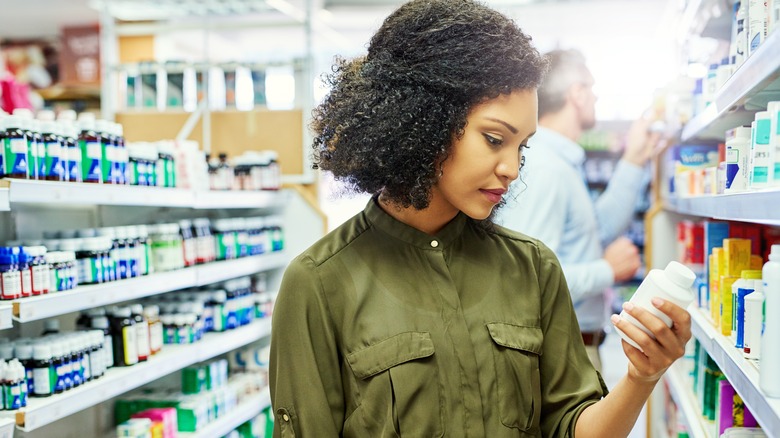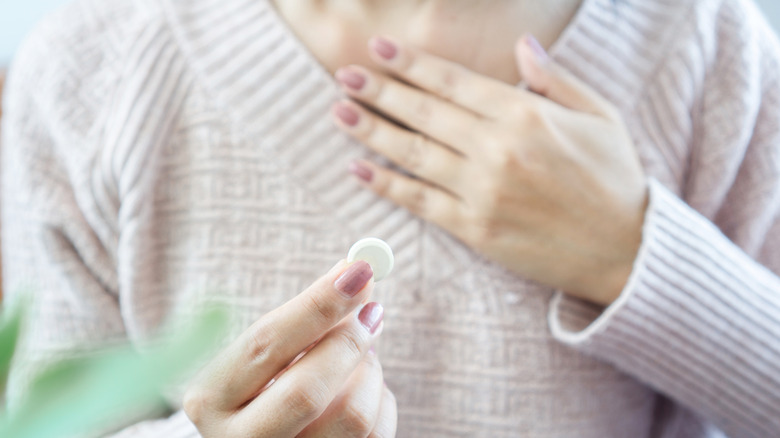The Popular Medication That Can Increase Your Risk Of Kidney Stones
While often related to dietary intake, kidney stones — hard, chemical deposits that form in the urinary tract — can also develop as a side effect of some medications. Certain antivirals, diuretics, and antibiotics are among those that fall on the list of potential kidney-stone-triggering drugs (per Mount Sinai). In an exclusive interview with Health Digest, Dr. Justin J. Houman, MD, who specializes in men's health, male fertility, and urology, explained why over-the-counter (OTC) antacids are another popular medication that can make one more susceptible to kidney stones.
Overconsumption of OTC antacids that contain calcium carbonate can increase the risk of kidney stone formation. "When consumed in large quantities, calcium from antacids can combine with oxalate in the urine to form calcium oxalate stones, which are the most common type of kidney stones," Dr. Houman stated. They are so common, in fact, that a 2006 research paper published in the Canadian Medical Association Journal (CMAJ) outlines how 80% of all calcium-based kidney stones are calcium oxalate stones.
How much is too much when it comes to antacids?
Used to treat intermittent bouts of heartburn-related gastroesophageal reflux disease (GERD), antacids are made up of a combination of magnesium, aluminum, and calcium salts that work by neutralizing stomach acid (per StatPearls). GERD is a chronic condition that occurs when the lower esophageal sphincter does not tighten as it should, allowing for the backflow of stomach contents up into the esophagus, explains the National Institute of Diabetes and Digestive and Kidney Diseases (NIDDK).
Dr. Houman told us that taking a calcium-based antacid or two every now and again generally poses no harm. Using these medications on an ongoing basis, however, or exceeding the recommended intake of no more than 2,000-2,500 milligrams of calcium daily can increase the likelihood of stone formation, especially if you're someone who is particularly prone to kidney stones. "If you find yourself needing antacids frequently, it's crucial to consult with a healthcare provider to address the underlying cause of your symptoms," Dr. Houman emphasized.
Six tips for reducing your risk of kidney stones
In addition to being mindful of calcium intake, Dr. Houman offers us six tips for minimizing one's risk of kidney stones.
The first is to try and drink between 2 and 3 liters of water each day with your health provider's approval.
Next, aim to keep sodium consumption to a minimum. "High sodium intake can increase calcium excretion in the urine, which can contribute to stone formation," Dr. Houman stated. "Reducing salt in your diet can help lower this risk."
Instead, focus on eating hydrating fruits and vegetables that are rich in fiber to benefit urinary tract health. Plant-based protein sources are also a great option over excess animal-based proteins, he added.
Dr. Houman's fourth tip is to reduce our intake of high-oxalate foods like spinach, nuts, and chocolate. Together with calcium, these compounds increase the risk of developing kidney stones.
Finally, maintaining a healthy weight, and being careful not to overload on calcium supplements can help us maintain normal calcium levels and best support the health of our urinary tract.
To learn more about Dr. Houman, visit his website at houmanmd.com



